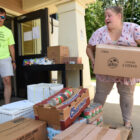When her car started making a noise more than a year ago, Chinara Johnson parked the vehicle and hasn’t used it since. As a New Haven mother of 5-year-old twin boys, one of whom is on the autism spectrum, and an 8-year-old daughter, Johnson doesn’t have the money to get the car running properly again. She also didn’t have money for childcare as she underwent breast cancer treatments, including surgery and chemotherapy, and is now struggling with increased utility and food bills since the kids are home during the pandemic. Over the past few years, Johnson has not been eligible for federal child tax credits because she doesn’t make enough money. But under the American Family Act—sponsored by U.S. Rep. Rosa DeLauro, D-3rd District, and others—Johnson would qualify to receive direct payments of $3,600 each for the boys and $3,000 for her daughter in federal child tax credits.



